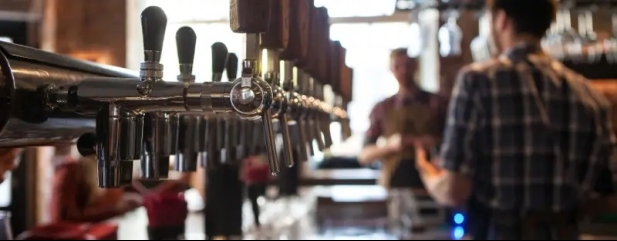Archived article
Please note that tax, investment, pension and ISA rules can change and the information and any views contained in this article may now be inaccurate.
JD Wetherspoon shares are much too cheap given its growth prospects

JD Wetherspoon (JDW) 602p
Market cap: £732 million
The market has a well-understood tendency to overshoot and undershoot, and in the case of pub group JD Wetherspoon (JDW) we think it has pushed the shares much too low given the qualities of the business and the risks it faces.
Considering the company raised its earnings guidance last month and reinstated the dividend thanks to ‘robust’ like-for-like trading, the sell-off around the budget – when the hike in employer NI (national insurance) contributions and the national living wage had already been well telegraphed to the market – made little sense.
If the Stockopedia consensus estimate of 59p of EPS (earnings per share) for July 2026 is correct, the shares look very cheap on a multiple of just over 10 times – if, as we suspect, analysts are being too conservative, and earnings are notably higher in 18 months or so, the shares are an absolute steal.
VALUE FOR MONEY
For the year to this July, the group posted more than £2 billion of sales for the first time, 5.7% above the previous year, and with fewer pubs, meaning like-for-like sales were 7.6% higher year-on-year and 16% above pre-pandemic levels, leading analysts to raise their 2025 and 2026 forecasts cautiously.
Trading since July has been healthy, and the firm said it saw ‘a reasonable outcome for the current financial year’, even with the increase in labour and NI costs.
The investment case for ‘Spoons’, as it is affectionately known, is firstly it doesn’t need a strong UK economy to thrive – it does equally well when times are tough, as people still spend on experiences, they just trade down slightly in terms of price.
The firm’s relatively low price position, its well-located and well-invested venues, high levels of staff training, the use of technology to speed up ordering, its selection of real ales (a quarter of its pubs are listed in CAMRA’s 2024 Good Beer Guide), its ‘club’ nights (steak on a Tuesday, curry on a Thursday) and an award-winning children’s menu put it streets ahead of its rivals in terms of popularity.
Second, as well as healthy like-for-like trading, the company can grow sales by growing its estate once more after several years of shrinkage – it now talks of potential for around 1,000 pubs in the UK compared with 800 as of July 2024.
Third, the valuation at today’s price is the lowest in more than 30 years on a cyclically-adjusted PE basis, with consensus earnings of 59p in July 2026 entirely consistent with an EPS growth rate of 9% since the early 1990s (achieved without buybacks, note).
RISKS TO OUR BUY CASE
There is no such thing as a free lunch, however, and no investment comes without its risks.
Much has been written for example about young people no longer drinking as much and the potential demise of pubs, and in fairness the ‘on-trade’ only accounts for 40% of UK beer sales against 90% a few decades ago.
However, of the 60% bought ‘off-trade’ the vast majority is consumed at home, so young people may be consuming just as much as they did, just in a different environment, and it’s down to the pub operators to win them back.
That said, Wetherspoon’s pubs are no longer old-fashioned ‘boozers’ – today, the highest-selling draught product by far is cola, and even that is dwarfed by the volume of tea and coffee sold, which shows how much the business has matured in recent years.
There are concerns over the firm’s debt load, which historically has been quite high, relatively speaking, but even with the headwinds presented by the pandemic the level of borrowing has been cut significantly.
In January 2020, debt excluding leases on the pubs where it doesn’t own freehold (about 30% of the estate) was over £800 million whereas by July 2024 that figure was down to £660 million.
As interest rates fall, so the cost of debt will decrease, which means more cash to pay down borrowings, but higher labour costs may mean progress is slower than investors would like.
The final risk for us is whether Tim Martin himself stays with the business.
Love him or loathe him, Martin embodies Wetherspoons and has been the driving force in raising the quality and level of service as well as finding new ways to get punters through the doors such as introducing breakfast menus.
Martin has also campaigned tirelessly for the pub sector to be treated fairly from a regulatory and tax perspective, arguing against new licensing laws and the preferential treatment of supermarkets who sell cheap booze with no VAT.
We’re not saying he’s about to hang up his boots, even though he sold a chunk of stock in June, just that if he did the firm would be poorer for it.
Important information:
These articles are provided by Shares magazine which is published by AJ Bell Media, a part of AJ Bell. Shares is not written by AJ Bell.
Shares is provided for your general information and use and is not a personal recommendation to invest. It is not intended to be relied upon by you in making or not making any investment decisions. The investments referred to in these articles will not be suitable for all investors. If in doubt please seek appropriate independent financial advice.
Investors acting on the information in these articles do so at their own risk and AJ Bell Media and its staff do not accept liability for losses suffered by investors as a result of their investment decisions.
Issue contents
Feature
Great Ideas
News
- Is Berkshire Hathaway’s record cash pile telling investors to be cautious?
- Markets eye further rate cuts ahead of inflation and consumer price data
- ‘Magnificent Seven’ hand markets the good, the bad and the ugly
- Market rallies as Trump secures clear victory in US presidential election
- Why the investment trust consolidation trend is set to continue
 magazine
magazine








